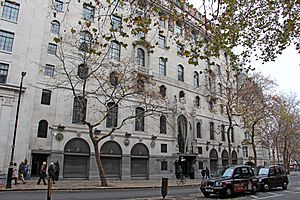India House, London facts for kids
Quick facts for kids High Commission of India in London |
|
|---|---|
 |
|
| Address | India House, Aldwych, London WC2B 4NA, United Kingdom |
| Jurisdiction | |
| High Commissioner | Vikram Doraiswami |
| Website | |
|
Listed Building – Grade II
|
|
| Official name: India House | |
| Designated: | 16 January 1981 |
| Reference #: | 1066491 |
The High Commission of India in London is like India's official office in the United Kingdom. It is where Indian diplomats work to keep good relations between India and the UK. This important office is located in a building called India House on Aldwych street in London. It is near other famous buildings like Bush House and Australia House. It also faces the London School of Economics and King's College London. Since 1981, India House has been a Grade II listed building, which means it is a special historic building.
Contents
History of India House
Why was the High Commission created?
In 1919, a group led by the Marquess of Crewe decided that India needed its own representative in London. This person would handle India's business and official tasks. Before this, the India Office in London managed everything. People in India also hoped this change would help India gain more independence.
The Government of India Act 1919 agreed with this idea. It allowed for a "High Commissioner for India" to be appointed. This person would act on behalf of the Indian government.
Who was the first High Commissioner?
On August 13, 1920, King George V officially created the position. Until India became independent in 1947, the role was called "High Commissioner for India." The very first High Commissioner was Sir William Stevenson Meyer. The first Indian person to hold this important job was Sir Dadiba Merwanji Dalal. The High Commissioner had the same important status as representatives from other British Dominions. After India gained independence, the title changed to its current name, "High Commission of India."
When was India House built?
The idea for the India House building came from Sir Atul Chandra Chatterjee, who was the Indian High Commissioner in 1925. The building was designed by a famous architect named Sir Herbert Baker. It was finished in 1930. King George V officially opened India House on July 8, 1930.
In 1991, a statue (called a bust) of Jawaharlal Nehru, who was India's first Prime Minister, was put in place. Prime Minister John Major unveiled it.
Emblems on India House
There are twelve special symbols, called emblems, on the outside of India House. These emblems represent the different provinces of India during the time of the British Raj (British rule). Each emblem tells a story about a specific region.
| Emblem | Province | Image |
|---|---|---|
| Bengal tiger and an East India Company ship | Bengal |  |
| Two ships and Fort George | Bombay |  |
| Fort St. George | Madras |  |
| Bow and arrow, two rivers (Ganges and Yamuna), and two fishes | United Provinces |  |
| Sun and five rivers (Beas, Chenab, Jhelum, Ravi, and Sutlej) | Punjab |  |
| Bodhi tree and two swastikas | Bihar and Orissa |  |
| Hills, Indian cobra, and orange and grape plantations | Central Provinces and Berar |  |
| Indian elephant and nine lotuses | Delhi |  |
| Indian rhinoceros | Assam |  |
| Indian peacock | Burma |  |
| Two Dromedary camels and hills | Baluchistan |  |
| Crescent moon, hills, and Jamrud Fort | North West Frontier |  |
Gallery
-
Bust of Jawaharlal Nehru on India Place
 | Isaac Myers |
 | D. Hamilton Jackson |
 | A. Philip Randolph |




